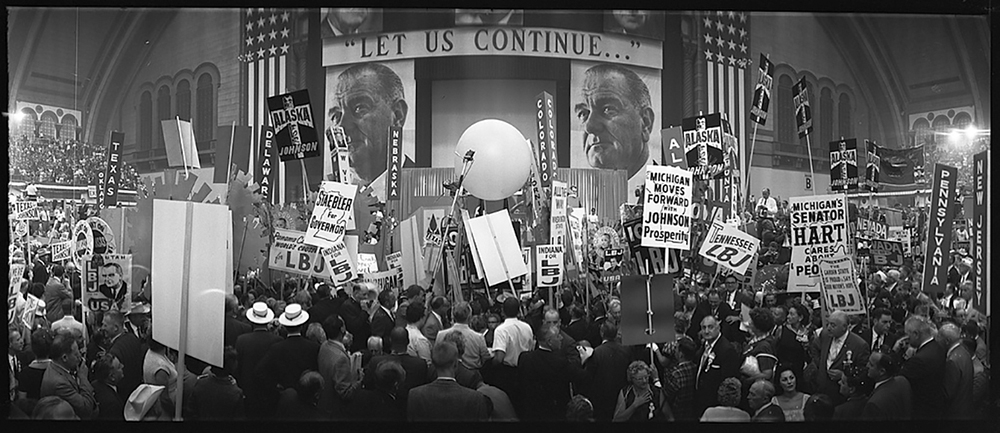By Bruce Klauber
The year 1964 was supposed to be a high point for Atlantic City. Although the coming of inexpensive air travel to Florida and other points south had taken away some business from the shore, Atlantic City was still known as the “Queen of Resorts” and the vacation destination of choice for thousands.
There were some positive developments happening. In that year the Atlantic City Expressway was completed, service on the Cape May-Lewes Ferry began and The Beatles invaded the city via their historic concert at Convention Hall. The city fathers, then informally led by Republican state Sen. Frank “Hap” Farley, believed hosting the convention would solidify Atlantic City’s national reputation as a vacation destination so they lobbied the Democratic National Committee to hold the Democratic Convention in Atlantic City. And so it was.
In addition to Farley, the lobbying was spearheaded by then-Atlantic City Mayor Joseph Altman, a Republican who was the city’s mayor from 1944 through 1967.
It all looked good on paper, so it was resolved that the 1964 Democratic National Convention would take place at Convention Hall from Wednesday, Aug. 24, through Friday, Aug. 27, 1964. Lyndon Johnson would be nominated for a full term and Hubert “The Happy Warrior” Humphrey would be the vice presidential nominee.
Coming less than one year after the assassination of President John F. Kennedy, there would be no opposition and no real drama. In fact, aside from the traditional pomp and pageantry of any nominating convention, the high point of this one would be the address, on the convention’s last day, of Attorney General Robert Kennedy.
Because the nominees were shoo-ins and the only real convention news was a controversy involving the Mississippi Freedom Democratic Party’s claim that states’ delegates were unfairly chosen – the Freedom Party maintained that blacks had not been allowed to vote in the primaries – the national spotlight would be on Atlantic City, New Jersey.
In many ways the Atlantic City of 1964 was the same as it was in the 1930s. Restaurants like Hackney’s and Captain Starns were thriving, and the grand hotels were still standing and still doing good business.
But there were real signs of wear, tear and deterioration. The 638-room Traymore hadn’t changed much since its completion in 1914. The Dennis Hotel hadn’t been renovated since it opened in 1925. The Marlborough-Blenheim had been standing since 1906, the Chalfonte Haddon-Hall had been around since 1929 and the Ambassador hadn’t changed much since construction was completed in 1921. The still-standing Ritz-Carlton opened in 1921 and the Shelburne Hotel’s expansion was completed in 1926. There were a few newer motels, including the LaFayette Motor Inn, where the Beatles stayed that summer when they performed at Convention Hall, but it wasn’t enough.
By the first day of the confab on Aug. 24, the city was packed with local, regional and national media, and all were ready to report on whatever might make news at the convention, as well as just what the “Queen of Resorts” was really like.
It was a mess from the start. In a 2014 piece for the Courier Post, reporter Kevin Shelly described the scene.
“The 1964 Democratic Convention should have turned a welcome spotlight on Atlantic City,” Shelly wrote. “Instead, it forced an unrelenting glare because the city and its grand hotels were undeniably shabby, worn and poorly maintained.
“While those were glossed-over problems more than a decade in the making, they became the focus of news stories and word-of-mouth accounts,” Shelly continued. “The city’s decline went as far back as the 1950s, but the difference in 1964 was the media horde assembled for the convention took notice of the city’s care-worn condition. Infamously, (spigots) corroded by the salt water (were) still piped into many older hotels – a vestige of the city’s ‘health resort’ past. (One of them) broke off in the hands of labor leader George Meany. And he could not get it fixed.
“Towels were in short supply and guests in some cases were given paper towels instead. An exodus from the city had already begun before 1964, but the retreat became a stampede over the next decade.”
Also in 2014, Bob Golon looked back on that summer in a piece he wrote 50 years after the convention for Inside Jersey.
“The odd curiosities and cheap goods were bad enough,” Golon said. “But the decrepit hotels, with cramped and dirty rooms, faulty plumbing and poor room service, would be the cause of the greatest shame.”
“Democratic conventioneers in August 1964 were met by burlesque shows, diving horses, flea circuses and myriad hucksters who peddled everything from salt water taffy and hot dogs to LBJ T-shirts, buttons and hats,” Golon wrote. “These visitors, not used to such ‘ambience,’ retreated to their hotel rooms for comfort and quiet. What they experienced there, however, was incredibly damaging to Atlantic City’s reputation and prosperity.”
In August 2023, Chuck Darrow wrote about those fateful four days in the pages of Shore Local News.
“Because then-President Lyndon Johnson was a mortal lock to win re-nomination,” wrote Darrow, “the hundreds of media types who descended on the town had little in the way of real ‘news’ to cover. Instead, they spent the ensuing four days putting the final nails in the coffin of AC tourism, telling millions of people around the world about the overpriced, understaffed, beat up, un-airconditioned rat traps in which they were bivouacked.”
The overwhelmingly negative national publicity surrounding the convention had an enduring impact on the resort’s reputation. Darrow maintained that, “the resulting awful publicity ultimately set in motion the wheels of the legal casino movement, which culminated in the opening of what was then Resorts International in 1978.”
The question, almost 60 years after the fact, is: What were the city power brokers thinking when they lobbied so aggressively to have the convention held in Atlantic City?
Golon believes that “local leaders were only thinking about what such an event could mean for the city. Perhaps it was a sense of ‘boardwalk hubris’ or general tone-deafness to the realities of the city, or possibly, a combination of the two.”
On Aug. 27, the final day of the convention, Robert Kennedy walked out on the convention floor and was greeted by a 22-minute ovation. It was the first time he publicly spoke about his brother and what his brother envisioned for the United States. He quoted from “Romeo and Juliet:”
“When he shall die, take him and cut him out into the stars, and he shall make the face of heaven so fine that all the world will be in love with night and pay no worship to the garish sun.”
There was hope that the fateful weekend would be remembered only for Kennedy’s speech. Sadly, it wasn’t. But Atlantic City had been down before and Atlantic City had beaten the odds more than once.
Maybe it was no longer known as the “Queen of Resorts” after 1964 and maybe it’s taken longer than expected to bounce back, but history has proven one thing: Atlantic City can never be counted out.
Bruce Klauber is the author of four books, an award-winning music journalist, concert and record producer and publicist, producer of the Warner Brothers and Hudson Music “Jazz Legends” film series, and a working jazz drummer and vocalist since childhood. He served as Technical Adviser on the Oscar-winning film, “Whiplash,” and on the 2018 Mickey Rourke film, “Tiger.” He has been honored by Combs College of Music and Drexel University for his “contributions to music journalism and jazz performance.”










